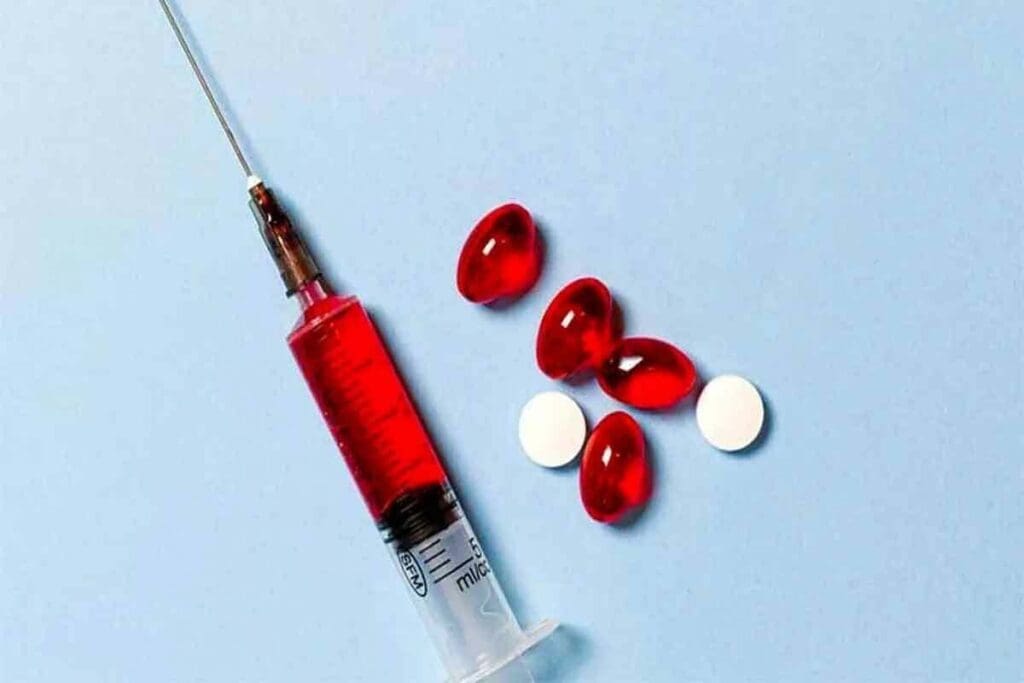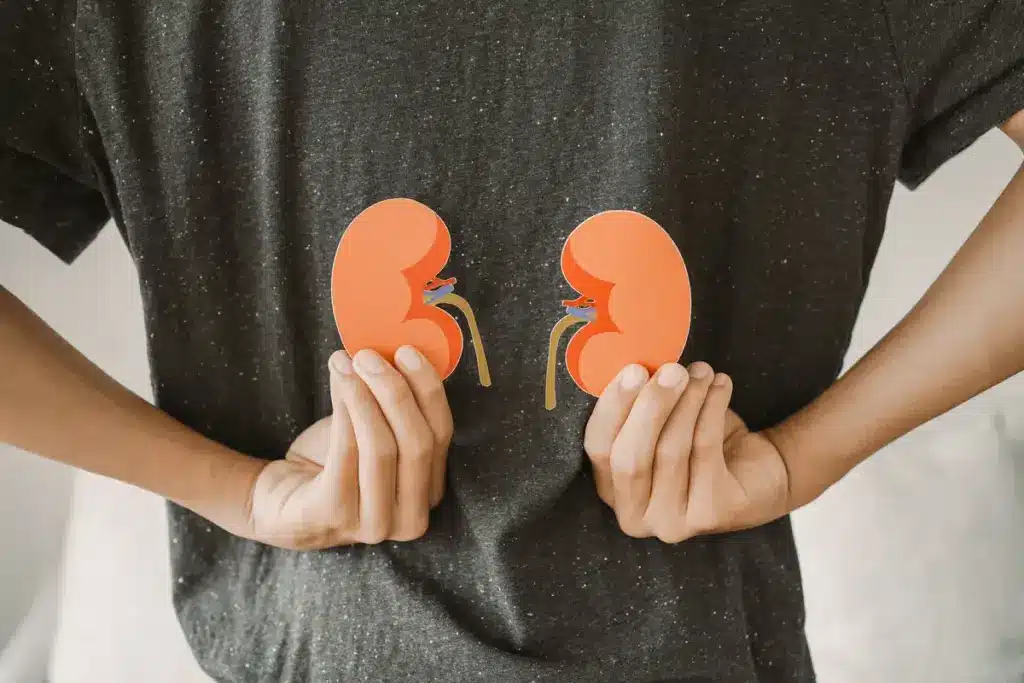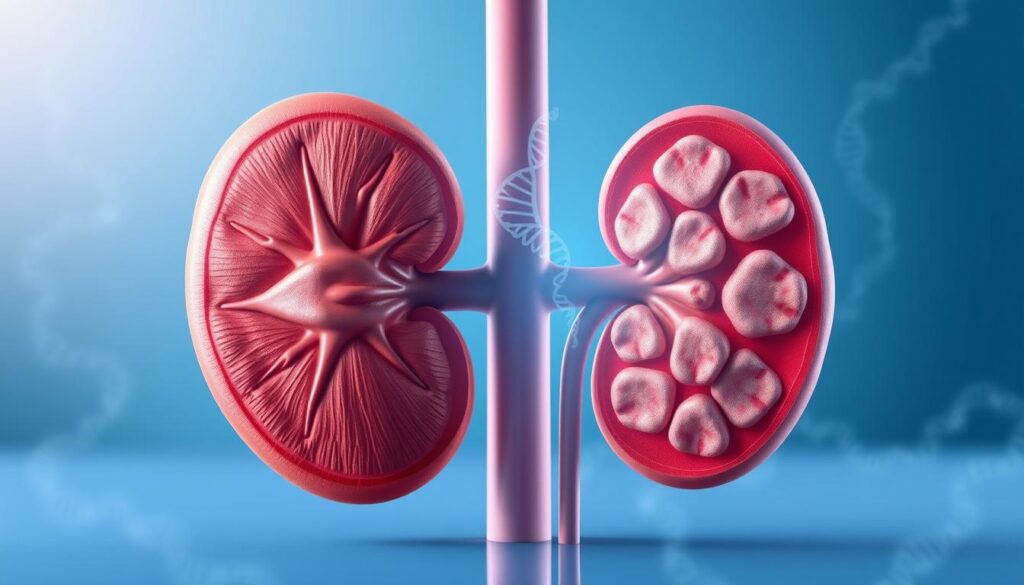
Vitamin B12 is essential for neurological function and DNA synthesis. A deficiency can cause various health issues, including megaloblastic anemia and neurological changes. At LivHospital, we understand the importance of Vitamin B12 for overall health, for adults at risk of deficiency.
The standard dosage for Vitamin B12 injections in adults is 1000 mcg (1 mg). It’s given intramuscularly (IM) or subcutaneously. This dosage is often given daily for a week, then weekly for a month, and monthly for maintenance, based on the deficiency’s severity.
Key Takeaways
- Vitamin B12 is vital for neurological function and DNA synthesis.
- A typical dosage is 1000 mcg (1 mg) administered IM or subcutaneously.
- The frequency of administration depends on the severity of the deficiency.
- Maintenance therapy is usually monthly.
- Understanding the appropriate dosage and administration method is vital for effective treatment.
The Essential Role of Vitamin B12 in Adult Health

Vitamin B12 is key for many health aspects in adults. We’ll look at its important roles, what happens if you don’t have enough, and how injections help keep levels right.
Critical Functions of B12 in the Body
Vitamin B12 helps make red blood cells, supports the nervous system, and is needed for DNA. A lack of it can cause tiredness, changes in the nervous system, and megaloblastic anemia. It also aids in breaking down fats and proteins.
Common Causes of B12 Deficiency
Not getting enough B12 can happen for several reasons. It’s a big issue for those who don’t eat meat or dairy, and for people with certain health problems. Issues like pernicious anemia and some gut problems can also cause it.
Knowing why people might not get enough B12 is important. It helps us find ways to prevent or treat it.
When Injections Become Necessary
If you can’t absorb B12 from food, shots are a good solution. Vitamin B12 injections can quickly help symptoms improve. They’re often given to people with certain health issues or who follow special diets.
Doctors decide if someone needs B12 shots based on their health and how much B12 they have.
Standard B12 Injection Dosage for Adults

Vitamin B12 injections have a standard dosage that is key to their effectiveness. This vitamin is important for making red blood cells, nerve function, and DNA. For adults, the usual dose is 1000 mcg (1 mg) per shot.
The Standard 1000 mcg (1 mg) Dosage
The 1000 mcg (1 mg) dose is the standard for adults. It helps fill up Vitamin B12 stores in those who are lacking. The dose might change based on how severe the deficiency is.
Understanding Dosage Measurements
Vitamin B12 shots are measured in micrograms (mcg) or milligrams (mg). 1 mg is the same as 1000 mcg. Knowing these measurements is key for the right dose.
Converting Between mcg and mL
To switch between mcg and mL, you need to know the Vitamin B12 solution’s concentration. For example, if it’s 1000 mcg/mL, then 1 mL has 1000 mcg (or 1 mg) of Vitamin B12. So, for a 1000 mcg dose, you give 1 mL of the solution. This is important for healthcare providers and patients to know their treatment plan.
In summary, the usual dose for Vitamin B12 shots in adults is 1000 mcg (1 mg). It’s important to understand the units and how to convert them for effective treatment. Knowing how to switch between mcg and mL helps ensure patients get the right dose, leading to better results.
Administration Routes: Choosing the Right Method
Vitamin B12 injections can be given in different ways. Each method has its own rules and when to use it. The choice depends on the patient’s health, how bad the deficiency is, and the doctor’s advice.
Intramuscular Injection Technique
Intramuscular (IM) injections are a common way to give Vitamin B12. This method puts the vitamin into a muscle, usually in the arm or buttock. IM injections allow for slower absorption, giving the vitamin to the blood over time.
Doctors should follow certain steps for IM injections. This includes picking the right needle and making sure the area is clean and safe.
Subcutaneous Administration Guidelines
Subcutaneous injections put Vitamin B12 into the fat just under the skin. This is often for people who need shots often or have less muscle. Subcutaneous injections can be less painful and easier to do yourself.
It’s important to change where you give the shot to avoid problems and make sure the vitamin is absorbed well.
Intravenous Delivery: When and Why
Intravenous (IV) Vitamin B12 is for very bad cases or when you need it fast. IV delivery puts the vitamin right into your blood. This is very important in some situations.
The b12 intravenous dose and b12 iv dose must be set by doctors. They look at the patient’s needs and health. IV shots need careful watching to avoid bad side effects.
B12 Injection Treatment Protocols and Schedules
Fixing Vitamin B12 deficiency needs a clear plan. This plan starts with a loading phase and then moves to maintenance therapy. We’ll show you how to set up treatment plans for each patient.
Initial Loading Phase: Daily Injections
The first step is key to quickly fixing Vitamin B12 levels. Daily injections of 1000 mcg (1 mg) of Vitamin B12 are given. This helps fill up Vitamin B12 stores fast.
How long this phase lasts depends on how bad the deficiency is and how well the patient responds. Usually, it’s 5 to 7 days of daily shots.
Transition to Weekly Administration
After the first phase, shots are given weekly. This change keeps Vitamin B12 levels high but cuts down on shots.
Weekly shots are kept up for weeks to keep Vitamin B12 levels stable. This helps the patient get better.
Monthly Maintenance Therapy
When Vitamin B12 levels are stable, monthly shots start. These shots keep Vitamin B12 levels good and stop deficiency from coming back.
Monthly shots are key for patients at risk of Vitamin B12 deficiency. This includes those with pernicious anemia or gut problems.
| Treatment Phase | Injection Frequency | Typical Duration |
| Initial Loading Phase | Daily | 5-7 days |
| Transition Phase | Weekly | Several weeks |
| Maintenance Therapy | Monthly | Ongoing |
By sticking to this treatment plan, doctors can manage Vitamin B12 deficiency well. This improves patient results.
Vitamin B12 Intramuscular Dosage Guidelines
The intramuscular route is often preferred for Vitamin B12 injections. It’s because it helps the body absorb it better. When giving Vitamin B12 shots, it’s important to follow the right steps. This ensures the shots work well and are safe.
Proper IM Injection Sites
Choosing the right spot for the shot is key. Common places include:
- The deltoid muscle in the upper arm
- The vastus lateralis muscle in the thigh
- The gluteus maximus muscle in the buttock
Each spot has its own benefits. The choice depends on what the patient likes and what the doctor thinks is best.
Technique for Maximum Absorption
To get the most out of the shots, the right technique is important. This includes:
- Using a sterile needle and syringe
- Inserting the needle at a 90-degree angle to the skin
- Aspirating to check for blood return before injecting
- Injecting slowly to minimize discomfort
By following these steps, the Vitamin B12 goes into the muscle tissue effectively.
Typical Dosing Schedule for IM Route
The dosing schedule for Vitamin B12 shots can change based on the patient. Common plans are:
- Initial loading phase: Daily or weekly shots for the first few weeks
- Maintenance phase: Monthly shots after the initial phase
The exact schedule depends on the patient’s needs and test results. A healthcare provider will decide this.
Intravenous B12 Dose Considerations
Healthcare providers must think carefully about Vitamin B12 IV doses. This method is used when other ways of taking B12 don’t work. It’s for specific cases where oral or muscle injections aren’t enough.
Standard IV Dosage Ranges
The dose of IV Vitamin B12 can change based on the patient’s needs. It usually ranges from 1 mg to 2.5 mg per shot. How often shots are given can also change, from every day to once a week.
Key considerations for IV dosage include:
- The severity of the Vitamin B12 deficiency
- The presence of any underlying medical conditions that may affect B12 absorption
- The patient’s overall health status and response to initial treatment
Clinical Scenarios for IV Administration
IV Vitamin B12 is used for severe deficiencies or when other methods fail. This includes:
- Patients with malabsorption issues due to gastrointestinal disorders
- Individuals with pernicious anemia or other conditions that impair B12 absorption
- Cases where a rapid increase in B12 levels is necessary
In these cases, IV delivery gets B12 straight into the blood. This skips over any absorption problems.
IV Infusion Protocols
When giving Vitamin B12 IV, it’s important to stick to set protocols. This ensures safety and effectiveness. This includes:
- Diluting the Vitamin B12 in a compatible IV solution
- Administering the infusion over a specified period, typically 30 minutes to an hour
- Monitoring the patient for any adverse reactions during and after the infusion
By carefully considering these factors and following established guidelines, healthcare providers can optimize IV Vitamin B12 therapy for their patients.
Tiaminal B12 Injection: Combined B1 and B12 Therapy
Tiaminal B12 injection is a special treatment. It combines Vitamin B1 and B12 for a complete fix for certain health issues.
Composition and Therapeutic Purpose
The Tiaminal B12 injection has thiamine (Vitamin B1) and cobalamin (Vitamin B12). It’s made to tackle both vitamin deficiencies at once. This is super helpful in some health cases.
This injection aims to fix both thiamine and cobalamin levels in the body. It helps solve related health problems and stops worse issues from happening.
Recommended Dosage Guidelines
The right dose of Tiaminal B12 injection varies. It depends on the patient’s health and the doctor’s advice. Doctors look at each patient’s situation to decide the best treatment plan.
It’s key to stick to the recommended dose. This makes sure the treatment works well and keeps side effects low.
Specific Indications for Combined Therapy
Tiaminal B12 injection is for people with both thiamine and cobalamin deficiencies. This can happen in malabsorption syndromes, chronic alcoholism, and some neurological issues.
This therapy has big benefits. It makes treatment easier and can lead to better health results. This is because Vitamins B1 and B12 work well together.
Individualizing B12 Injection Dosage for Adults
It’s important to tailor Vitamin B12 injections for adults. Each person’s needs are different. A personalized plan is key for the best results.
Patient-Specific Factors Affecting Dosage
Several factors can change the right dose of Vitamin B12. These include:
- Age and overall health status
- Severity of Vitamin B12 deficiency
- Presence of underlying medical conditions, such as gastrointestinal disorders
- Concurrent medications that may interact with Vitamin B12
For example, older adults or those with severe deficiencies might need more. Patients with certain health issues might need their doses adjusted to avoid problems.
Laboratory Monitoring and Dose Adjustments
Lab tests are vital for adjusting Vitamin B12 doses. We suggest regular blood tests to check:
- Serum Vitamin B12 levels
- Methylmalonic acid (MMA) and homocysteine levels
- Complete Blood Count (CBC) to monitor for signs of anemia
These results help us adjust the dose. As one expert says,
“Regular monitoring is essential to tailor Vitamin B12 therapy to individual patient needs and prevent over- or under-treatment.”
Response-Based Dosing Strategies
We adjust Vitamin B12 doses based on how well the patient responds. We look at:
- Improvement in symptoms like fatigue and weakness
- Normalization of laboratory values
- Presence of any side effects or adverse reactions
By using patient-specific factors, lab tests, and response-based strategies, we create a custom Vitamin B12 plan. This ensures adults get the best treatment for their unique needs, improving their health.
Weekly Vitamin B12 Injection Dosage for Adults in mL
Vitamin B12 injections are given weekly to many adults. Knowing the right dosage in mL is key. This helps keep B12 levels just right.
Standard Weekly Protocols
Most adults get 1000 mcg (1 mg) of Vitamin B12 weekly. The Neo-B12 injection datasheet says this is for keeping B12 levels up.
Calculating the Correct Volume
To figure out the right mL volume, we look at the solution’s concentration. A 1 mL solution has 1000 mcg of Vitamin B12. So, for a 1000 mcg dose, you need 1 mL.
Administration Tips for Weekly Dosing
When giving Vitamin B12 injections weekly, proper technique is vital. Here are some tips:
- Rotate injection sites to avoid tissue damage.
- Use a clean needle and syringe for each injection.
- Administer the injection at the same time each week.
By following these guidelines, healthcare providers and patients can ensure effective treatment. This includes understanding weekly protocols, calculating the correct volume, and following administration tips.
Prescription Requirements and Medical Supervision
Vitamin B12 injections need a prescription and careful medical watch. It’s key to know how to get a prescription, the role of your doctor, and how to give yourself the shot. This ensures you get the most from B12 therapy.
Obtaining a B12 Injection Prescription
To get a vitamin B12 injection prescription, you need to see a doctor. They will look at your medical history and might do some tests. This helps them decide if you need B12 shots and how much.
Healthcare Provider Monitoring
After starting B12 shots, you’ll need to see your doctor often. They will check your B12 levels and how you’re doing. They can change the dose or how often you get shots based on your progress.
Self-Administration Guidelines
If you’re giving yourself B12 shots, you need to know how. Your doctor will teach you the right way to do it. You’ll also learn how to store the shots and throw away needles and syringes safely. It’s important to know the signs of side effects and when to call your doctor.
Potential Side Effects and Safety Considerations
Vitamin B12 injections are usually safe but can have side effects. Healthcare providers must tell patients about these risks and benefits. This ensures safe treatment.
Common Reactions to B12 Injections
Most people do well with Vitamin B12 injections. But, some might feel a bit of pain or discomfort at the site. They might also see redness or swelling, or feel a bit of itching or rash.
These side effects are usually mild and go away quickly. But, if they don’t or get worse, it’s important to talk to a doctor.
Rare but Serious Adverse Effects
Even though rare, serious side effects can happen. These include:
- Anaphylaxis: A severe, life-threatening allergic reaction that needs immediate help.
- Heart problems in people with heart conditions
People with allergies or heart issues should tell their doctor before getting B12 shots.
Contraindications and Precautions
While B12 injections are safe for most, there are some exceptions:
| Condition | Precaution |
| Allergy to cobalt or cobalamin | Avoid B12 injections or use with caution under medical supervision |
| Leber’s disease | Use with caution as B12 may worsen the condition |
| Pregnancy and breastfeeding | Generally considered safe, but consult a healthcare provider |
Knowing about these side effects and precautions can help avoid risks. Always talk to a healthcare provider for advice tailored to you.
Conclusion: Optimizing Your B12 Therapy Journey
Understanding the right vitamin B12 injection dose is key to a successful therapy. We’ve talked about how important Vitamin B12 is for adults, the standard doses, and how to get them. Tailoring treatment to each person’s needs is essential for the best results.
Healthcare providers can make Vitamin B12 therapy more effective by watching how patients react to the treatment. They can then adjust the treatment to get the best results. Using the right methods and schedules is important for success.
The right dose of vitamin B12 can change for each person. Doctors need to think about these differences when planning treatment. With the right plan, Vitamin B12 therapy can greatly improve health and happiness.
FAQ
What is the standard dosage for Vitamin B12 injections in adults?
Adults usually get 1000 mcg (1 mg) of Vitamin B12 through injections. These are given either in the muscle (intramuscularly) or under the skin (subcutaneously).
How often should Vitamin B12 injections be administered during the initial treatment phase?
At first, you’ll get Vitamin B12 shots every day for a week. Then, you’ll get them once a week for a month.
What is the typical maintenance therapy schedule for Vitamin B12 injections?
After the first phase, you’ll get Vitamin B12 shots once a month. Sometimes, you might need them weekly.
What are the different administration routes for Vitamin B12 injections?
Vitamin B12 injections can be given in three ways: into the muscle (intramuscular), under the skin (subcutaneous), or through a vein (intravenous).
How do I convert between mcg and mL for Vitamin B12 injections?
To switch between mcg and mL, know the solution’s concentration. Vitamin B12 shots are usually 1000 mcg/mL. So, 1000 mcg is the same as 1 mL.
What is Tiaminal B12 injection, and when is it used?
Tiaminal B12 injection combines Vitamin B1 (thiamine) and B12. It’s for people with deficiencies in both vitamins.
How is the dosage of Vitamin B12 injections individualized for adults?
Dosage is tailored to each person. It depends on their health, lab results, and how they respond to treatment.
What are the common side effects of Vitamin B12 injections?
Side effects might include pain, redness, or swelling where the shot was given. But, serious side effects are rare. Always talk to a healthcare provider if you have concerns.
Can Vitamin B12 injections be self-administered?
Yes, you can give yourself Vitamin B12 shots. But, it’s important to learn how from a healthcare provider. This ensures you do it safely and correctly.
How do I obtain a prescription for Vitamin B12 injections?
To get a prescription, talk to a healthcare provider. They will check if you need Vitamin B12 shots and write a prescription if you do.
What is the role of healthcare provider monitoring in Vitamin B12 injection therapy?
Monitoring by a healthcare provider is key. They adjust dosages, manage side effects, and check if the treatment is working.
Are there any contraindications or precautions for Vitamin B12 injections?
Yes, some people might need to be careful or avoid Vitamin B12 shots. Always talk to a healthcare provider about your specific situation.
References:
- National Institute for Health and Care Excellence (NICE). (2024). Vitamin B12 deficiency in over 16s: diagnosis and management. https://www.nice.org.uk/guidance/ng239









